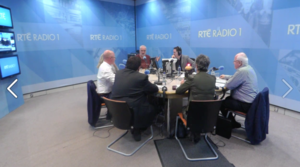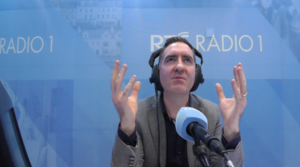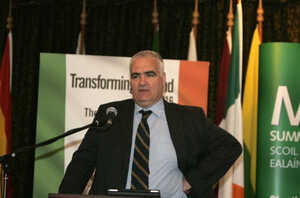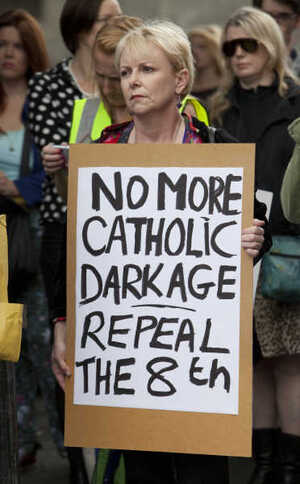

From top: the panel on Wednesday’s night’s Late Debate and the presenter Cormac Ó hEadhra
On Wednesday night.
On RTÉ Radio One’s Late Debate.
The panel discussed the Garda whistleblowers, following Garda Commissioner Nóirín O’Sullivan’s appearance before the Joint Oireachtas Committee on Justice and Equality earlier that day.
Readers will recall how, during that meeting, Independents 4 Change TD Clare Daly repeatedly asked Ms O’Sullivan if she would confirm legal counsel for one of the Garda whistleblowers wrote directly to her 14 times over a two-year period, outlining the whistleblower’s experience of surveillance and intimidation.
Ms Daly asked this based on Ms O’Sullivan saying she wasn’t privy to any information about allegations of mistreatment of whistleblowers.
Ms O’Sullivan repeatedly said she would not answer any specific questions in relation to any specific individual or any specific correspondence received.
The Late Debate panel included Fine Gael TD Colm Brophy; Independent TD Stephen Donnelly; Independent TD Catherine Connolly; Sinead Ryan, of the Irish Independent; Sean Healy, director of Social Justice Ireland; and Noel Whelan, barrister and Irish Times columnist.
From the panel discussion with presenter Cormac Ó hEadhra…
Cormac Ó hEadhra: “Let’s turn to the Budget in just a moment but we’ll start with the embattled Garda Commissioner Noirin O’Sullivan who came before the justice committee today, she had some serious questions to answer from the committee. Tonight the Tanaiste has staunchly defended the Commissioner. The Minister for Justice Frances Fitzgerald – Colm Brophy, your colleague in Fine Gael – has said there is no evidence of wrongdoing against Noirin O’Sullivan, is that correct though?”
Colm Brophy: “Well, I think so, and I was at the justice committee today. I was one of a number of TDs who had the opportunity to question and talk to the Garda Commissioner and I mean there’s no question. There are a swirl of allegations and comments and various other things but I thought the Commissioner dealt very fairly and squarely with them all. I think she answered every question she was asked and made it very clear that there were one or two areas that she can’t answer because she is prohibited from answering because she, because of her role and she but that I mean…”
Ó hEadhra: “But saying there’s no evidence at all, surely that’s not correct? Surely there’s a prima facie case to answer?”
Noel Whelan: “There…”
Ó hEadhra: “You’re saying there’s not, Noel?”
Whelan: “I’m sorry, I, I, I have to say I was appalled by the clips and I’ve only seen and heard the clips on the radio and on the television today that I saw. I said to myself is it any wonder that the public rejected the notion of giving Oireachtas committees powers when some members – and I emphasise some members – take a view that they can come into a committee and say, ‘somebody has told me this thing, this allegation’ and even though there’s an inquiry, has been appointed, to establish the evidence. I mean Clare Daly just said ‘I have evidence that’. She has evidence of nothing. She has hearsay of an allegation.”
Ó hEadhra: “She has…”
Whelan: “It’s hearsay…No…no it’s not evidence, it’s not evidence.”
Ó hEadhra: “She has evidence that needs to be tested.”
Whelan: “It’s not evidence.”
Ó hEadhra: “You’re saying there’s no prima facie case to answer.”
Whelan: “No, I’m, no, I’m not, that’s not what I’m saying.”
Ó hEadhra: “You did say.”
Whelan: “No, I didn’t, no…”
Ó hEadhra: “Yes you did, two seconds ago…”
Whelan: “No, you said…”
Ó hEadhra: “Two seconds ago…”
Whelan: “I said there is not evidence… no, my issue is her use and your word, your use of the word, your use of the word ‘evidence’. What seems to have happened here is somebody decided to use the confidential disclosure mechanism, which has recently been established pursuant to the whistelblowers’ acts which by it’s very nature means those about whom allegations are being made, the information is not shared with them. So if, in passing it seems, or in part of the context of allegations which seem to be directly related to the previous commissioner, it’s suggested that the current commissioner did something wrong, she would not be aware of who made those allegations or what precisely those allegations mean. Simultaneously with making those allegations to the Confidential Recipient – for confidential purposes – the people, or people close to the people who made the complaint talk to a range of journalists and politicians and give them the details…”
Ó hEadhra: “But why though?”
Whelan: “Why.”
Ó hEadhra: “Why do they do that?”
Whelan: “Even before the minister got a chance, even before the minister gets a chance to sit at her desk..”
Ó hEadhra: “Why would they do that I wonder?”
Whelan: “Exactly, exactly…”
Ó hEadhra: “You answer that question.”
Whelan: “Why wouldn’t they wait for the minister first to make a decision as to what to do next? What does the minister decide to do? The minister decides to go and get a high court judge to inquire into the precise allegations that are made because that person can then see what the allegations are and then test…”
Ó hEadhra: “Why would they go to journalists? Is it, I wonder, and this is just a question, I don’t know, is it I wonder because there’s a lack of trust in the chain of command within An Garda Siochana?”
Whelan: “Or because..”
Ó hEadhra: “Could it be that?”
Whelan: “It could of course…Of course it could be that…no, no, let me finish…let me answer…it could be that, or it could be because they want to undermine the Commissioner.”
Talk over each other
Whelan: “Irrespective of whether the allegations stand up or not…”
Ó hEadhra: “But given the fact, given the fact that a solicitor of one of the people who made the allegations…”
Whelan: “No…”
Ó hEadhra: “Hang on, hang on..”
Whelan: “You have to distinguish here…he is not…that solicitor does not represent one of the complainants to the confidential recipient…”
Ó hEadhra: “I accept that…”
Whelan: “And this is the confusion…”
Ó hEadhra: “Listen to my question though….”
Whelan: “No, but you said one of the allegators [sic], he’s not one of the persons making the allegations…”
Ó hEadhra: “One of the previous whistleblowers…”
Whelan: “Exactly…”
Ó hEadhra: “Right…. Has made an allegation that GSOC investigations, for example, a previous investigation set up, have been frustrated by the force. Now, when you call for due diligence and due process I mean and that due process is frustrated well what would you, as a barrister, do? If you’re involved…hang on now… this is the question, if you’re involved in an investigation, as a barrister, right? And you find that your investigations are being frustrated, for example, there isn’t a disclosure or a discovery, what do you do in that instance?”
Whelan: “Hold on, the whistleblower isn’t conducting this investigation. That investigation is being conducted by Justice Mary Ellen Ring and GSOC. She has complained about the fact that she doesn’t have power to compel a timely disclosure of information from the gardai so you address it that way or she goes in, she has done more publicly, called on a more speedy addressing of the information. Now, you don’t go and piggyback, you don’t go and seek to piggyback on an investigation that everybody says has to be conducted quickly, that everybody says is significant, in my view, it’s not significant, it’s potentially significant – if the evidence stands up. And everybody says, you appoint a high court judge to investigate two other complaints made on the confidential system by two other complainants, you don’t piggyback on that because all that will do is confuse, as has already happened here in the presentation of it and secondly, delay the outcome.”
Ó hEadhra: “But hold on, you’re after telling us that an investigation that is under way, the judge is in charge of it, and the judge has said, look this investigation is being delayed…”
Whelan: “She said she wants to move quicker…”
Ó hEadhra: “Yeah and…”
Talk over each other
Ó hEadhra: “In the meantime, more whistleblowers come forward, make an allegation and that is fished out to another investigation…”
Whelan: “No a whistleblower hasn’t come forward. What’s come forward is someone making a complaint to the confidential recipient that he himself was involved in a campaign to do in a whistleblower...”
Ó hEadhra: “Who is, in effect, another whistleblower...”
Whelan: “So then he becomes himself…”
Ó hEadhra: “Yes…”
Whelan: “A whistleblower..”
Ó hEadhra: “Yeah, so what? That’s what I said..”
Whelan: “But either because of remorse, as is suggested, or because it’s the best way to protect his own position...”
Ó hEadhra: “But the key question, Noel, is, the key question…”
Whelan: “And that’s why, we don’t have to decide this Cormac, that’s why you appoint a High Court judge do decide these things and what you don’t do: here’s the real unfairness and injustice, you don’t allow politicians then to go into committee and just lob those allegations or any other colourful allegations they want across the table and require a witness to respond. I mean that’s, that’s Trump-like politics…”
Talk over each other
Ó hEadhra: “Hang on…But there’s another parallel question…”
Whelan: “People are saying that, insert the most colourful thing that will get me most headlines...”
Ó hEadhra: “That is incorrect and unfair, Noel.”
Whelan: “I’m sorry, it’s not unfair. And the media have fallen for it.”
Ó hEadhra: “That is unfair.”
Listen back in full here
Previously: You’ll Get Nothing From Me
‘Was The O’Higgins Report Not Enough For You?’












